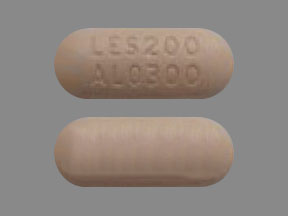Allopurinol/lesinurad Disease Interactions
There are 8 disease interactions with allopurinol / lesinurad.
- Secondary hyperuricemia
- Severe renal impairment
- Bone marrow suppression
- Dehydration
- Liver disease
- Renal dysfunction
- CV disease
- Hepatic impairment
Antihyperuricemic agents (applies to allopurinol/lesinurad) secondary hyperuricemia
Major Potential Hazard, Moderate plausibility. Applicable conditions: Tumor Lysis Syndrome, Lesch-Nyhan Syndrome, Organ Transplant
No studies with febuxostat or lesinurad have been conducted in patients with secondary hyperuricemia (including organ transplant recipients). The use of these drugs is contraindicated in patients where the uric acid formation is greatly increased, such as patients with malignant disease, tumor lysis syndrome or Lesch-Nyhan syndrome.
Lesinurad (applies to allopurinol/lesinurad) severe renal impairment
Major Potential Hazard, Moderate plausibility. Applicable conditions: Kidney Transplant, Renal Dysfunction
The use of lesinurad is contraindicated in patients with severe renal impairment, end stage renal disease, kidney transplant recipient and patients on dialysis.
Allopurinol (applies to allopurinol/lesinurad) bone marrow suppression
Moderate Potential Hazard, Moderate plausibility. Applicable conditions: Bone Marrow Depression/Low Blood Counts
Bone marrow suppression has been reported in patients receiving allopurinol; however, most of these patients were receiving concomitant medications with the known potential to cause such an effect. The suppression has occurred from as early as 6 weeks to as long as 6 years after the initiation of allopurinol therapy. Therapy with allopurinol should be administered cautiously to patients with or predisposed to bone marrow suppression.
Allopurinol (applies to allopurinol/lesinurad) dehydration
Moderate Potential Hazard, High plausibility. Applicable conditions: Diarrhea, Vomiting
Adequate hydration is necessary during therapy with allopurinol to prevent both the formation of xanthine calculi and renal precipitation of urates when concomitant uricosuric agents are given. Patients who are dehydrated (e.g., due to severe diarrhea or vomiting) may be at increased risk and should be encouraged to consume additional amounts of liquid or given intravenous fluid. In general, fluid intake sufficient to yield a daily urinary output of at least 2 liters is recommended. Maintenance of a slightly alkaline or neutral urine is also desirable.
Allopurinol (applies to allopurinol/lesinurad) liver disease
Moderate Potential Hazard, Moderate plausibility.
The use of allopurinol has infrequently been associated with asymptomatic elevations of serum transaminase and alkaline phosphatase levels. Isolated cases of cholestatic jaundice, hepatic necrosis, granulomatous hepatitis, and hepatomegaly have also been reported. Therapy with allopurinol should be administered cautiously in patients with liver disease. Periodic monitoring of liver function tests is recommended in these patients during the early stages of therapy.
Allopurinol (applies to allopurinol/lesinurad) renal dysfunction
Moderate Potential Hazard, High plausibility.
Patients with decreased renal function require lower dosages of allopurinol than normal to control serum urate levels. Therapy should be initiated at reduced dosages with smaller incremental changes in such patients. Additionally, individuals with preexisting renal disease or poor urate clearance have demonstrated a rise in BUN during therapy with allopurinol. Renal failure has also been observed among some with hyperuricemia secondary to neoplastic diseases. Renal function should be monitored during the initial stages of therapy, and the dosage reduced or the drug withdrawn if necessary.
Antihyperuricemic agents (applies to allopurinol/lesinurad) CV disease
Moderate Potential Hazard, Moderate plausibility. Applicable conditions: Cardiovascular Disease
Major adverse cardiovascular events (cardiovascular deaths, non- fatal myocardial infarctions and non- fatal strokes), were reported during clinical trials with some antihyperuricemic agents, such as febuxostat and lesinurad. Although a causal relationship has not been established, caution is advised when used in patients with cardiovascular disease. Monitoring for signs or symptoms of myocardial infarction or stroke is recommended.
Febuxostat/lesinurad (applies to allopurinol/lesinurad) hepatic impairment
Moderate Potential Hazard, Moderate plausibility. Applicable conditions: Liver Disease
No studies have been conducted in patients with severe hepatic impairment (Child-Pugh Class C), therefore caution should be exercised if using febuxostat or lesinurad on these patients. No dose adjustment is necessary in patients with mild or moderate hepatic impairment.
Switch to professional interaction data
Allopurinol/lesinurad drug interactions
There are 601 drug interactions with allopurinol / lesinurad.
Allopurinol/lesinurad alcohol/food interactions
There is 1 alcohol/food interaction with allopurinol / lesinurad.
More about allopurinol / lesinurad
- allopurinol/lesinurad consumer information
- Check interactions
- Compare alternatives
- Side effects
- Dosage information
- During pregnancy
- Drug class: antihyperuricemic agents
Related treatment guides
Drug Interaction Classification
| Highly clinically significant. Avoid combinations; the risk of the interaction outweighs the benefit. | |
| Moderately clinically significant. Usually avoid combinations; use it only under special circumstances. | |
| Minimally clinically significant. Minimize risk; assess risk and consider an alternative drug, take steps to circumvent the interaction risk and/or institute a monitoring plan. | |
| No interaction information available. |
Further information
Always consult your healthcare provider to ensure the information displayed on this page applies to your personal circumstances.


